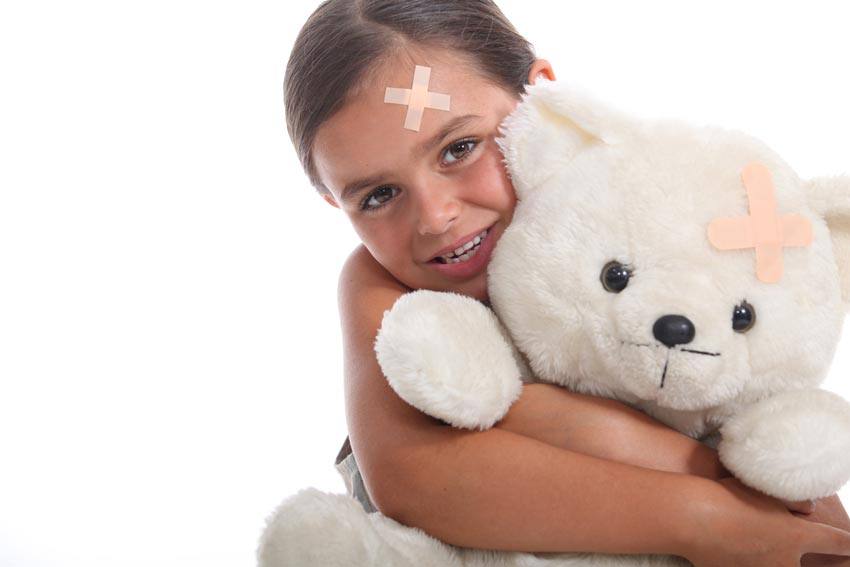Why our customers prefer Blue Cross
- Option of getting insured without a medical exam
- Excellent rates
- Pioneer in the field of health insurance with over 80 years of experience
- Friendly service from experienced agents who can answer your questions and assist you when needed
- Coverage that can be customized to meet your specific needs
- Discounts and savings with our one-of-a-kind Blue Advantage program

Childhood concussions: Symptoms and treatment
Published on: February 2, 2015
Concussions have received a lot of attention in recent years. While they are often mentioned in relation to sports, concussions can happen to anyone at any time, even children. They can occur with any type of head injury, often without a loss of consciousness.
Concussions are not limited to sports injuries. They can happen in various situations, such as car accidents, falling off a bicycle, slipping on ice in the winter, when roughhousing with friends and at any other times when children are at risk of hitting their head.
What is a concussion?
As defined by KidsHealth from Nemours, “a concussion is a type of traumatic brain injury. The brain is made of soft tissue and is cushioned by spinal fluid. It is encased in the hard, protective skull. The brain can move around inside the skull and even bang against it. If the brain bangs against the skull — for example, due to a fall on a playground or a whiplash-type of injury — blood vessels can be torn, and the nerves inside the brain can be injured.” It is these injuries to the brain that can cause a concussion.
Symptoms of a concussion
Concussions can be difficult to diagnose. This is why they are a tough medical condition to manage. Any child who has experienced a head injury should be monitored closely for signs of a concussion. If any symptoms are present, take your child to the hospital immediately to be examined. An undiagnosed concussion could put your child at risk for brain damage.
Concussion symptoms typically present themselves in four main ways:
- Physically: Feelings of tiredness, lack of energy, trouble with balance, sensitivity to light and noise, headache, nausea, dizziness, blurred vision
- Mentally: Feeling slow, difficulty concentrating, trouble thinking clearly
- Emotionally: Feeling anxious, irritable and more emotional than normal
- Sleep patterns: Sleeping more than usual, trouble staying asleep
Other signs to keep an eye out for in young children include crying more than usual, changes in behaviour, having temper tantrums, loss of balance and changes in eating and sleeping patterns.
Keep in mind that all symptoms may not appear at once, and new symptoms can arise over time. For a more detailed discussion about the signs of a concussion, see the Centers for Disease Control and Prevention website.
How to treat a concussion
One of the most difficult things about concussions is that they affect everyone differently, and the treatment will depend on the severity of the concussion and its impact on the individual. Most kids will bounce back and recover quickly when a concussion is treated properly. For others, the symptoms can last for days, weeks or even months.
It’s important to understand that once a child has a concussion, they will be more susceptible to getting another one, even from a slight bump to the head, making prevention even more important.
If your child shows signs of a concussion, get them medical attention immediately. Depending on the severity of the concussion, your child may be kept in the hospital overnight for observation; however, it is also common for them to be sent home.
Resting the brain and the body is the best way to recover from a concussion. This means getting plenty of rest and sleep, and avoiding any strenuous activity. For some, this may also include limiting exposure to light or noise.
How much rest is needed will depend on your child. To support the recovery process, your child should:
- Get plenty of sleep at night
- Take it easy during the day (this may include staying home from school)
- Avoid mentally challenging activities
- Avoid physical activity, including all sports, for a few weeks or until symptoms go away
- Limit their exposure to computers, TVs and phones
- Use pain medication as directed by your doctor
- Use a cold pack for 10- to 20-minute intervals, if swelling occurs
- Integrate new activities slowly
Even though your child may feel as though they are back to normal, make sure they take things slowly. If symptoms return when your child is engaged in a specific activity, they should stop the activity immediately and rest for the remainder of the day. Recurring symptoms are a sign that your child continues to need rest. If symptoms persist, call your doctor for further instructions.
Protecting your family from unforeseen accidents is important. Take a look at our health insurance tips for families to find out what kind of health insurance is best for you.